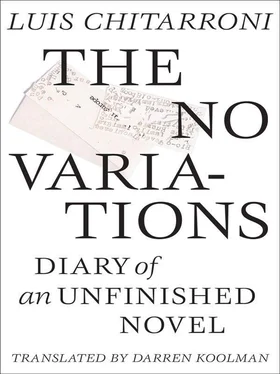Subtraction after subtraction, I remained in the wicker basket. I thought my disappearance — sorry, my absence — would make them miss me down below. Make them feel relieved, I immediately thought. I was reminded of Tom Sawyer Abroad , when the Negro, Jim, believes he sees Virginia because he once saw it colored pink on a map. While traveling by balloon. Then time dissolved, and I saw the map of my past, in monochrome at first, until a few colors began appearing here and there. And I saw myself arriving at the first meeting of Agraphia —me, still wearing glasses — when Remo Sabatani was still at the journal. And nearby, in a kind of rhombus of ochre hue, another scene, the famous black mass at the house on Giordano Bruno Street. And then a mad rush to the present, to Hilarión Curtis’s wake at the house on Piedras Street, Eloísa’s house in Avellaneda. And, symmetry goes, symmetry comes,
Semblance [ A Russian Tale ]
There are people who wait for us and those who disappoint us. They come to us without us having to go to them [reciprocity], as if these encounters happen for the sake of only one of us, as if they’d been randomly or deliberately [premeditatedly] set in motion to range across the world searching for the one among us, the only one in the world, who is equipped to tell their story. Or maybe not, maybe these are in fact the most predictable of encounters, and we, although we’ll never fully accept it, are perhaps for them as shadowy a group as they appear to us. As long as we cling to our consciousness [conscience], I suspect we’ll never know [[if any of them talk of reciprocity.]] They are difficult people to keep inside the head, beings whose lives are only imaginable because they reside in the suburbs of our memory: imaginable but obscure, because these suburbs skirt the frontiers of oblivion — that which cannot be imagined — so that they’re only capable of being recalled, evoked, by a formula that sometimes works, but more often does not. If it does work, then the story begins to emerge, although the character, the protagonist, remains shadowy. So it was in the case of Velemir Dimitrovich Pachin. It matters not that we came to learn about him during our wanders in exile. It matters not that the unwavering dark forces of the imagination enveloped him until someone came along and announced — or shouted, rather— Attempt . Suire’s [Sartre’s] work was the password that unlocked it, and the pretext for telling the following tale. So although the premiere was so long censored, confirmation of the rumored plot was leaked by both major and minor actors alike, and Velemir Dimitrovich finally became a part of the permanent cast of characters in the shadowy opera buffa of memory.
Velemir Dimitrovich Pachin didn’t attend the meeting at Elena Fiodorovna’s home because his coat was frayed. For years he’d treated it with neglect: an old-fashioned serge doublet with beaver skin lapels that his uncle on one occasion had brought him from Oslo or Helsinki. [[On one occasion, he forgot it … and managed to retrieve it a year later. But that’s another story.]]
Velemir Dimitrovich had no virtues to speak of, but neither had he any vices, unless his proneness for distraction could be considered a vice, or his neutral stance concerning all things good and evil, complemented by an expressionless face — somewhat comic, adorned with one of those Russian noses that provoke teasing in childhood but, in adulthood, becomes a harmless, unflagging instrument — accorded him the virtue of being a good actor, a consummate actor. Yes, although his nose had been a cause of much affront and inconvenience to others, he, Velemir Dimitrovich, was completely lacking in that quality which, in the vaguest terms, is called intuition. When Olga Fiodorovna invited him to stay one October afternoon in the gazebo beside the train station, Pachin said yes, he would go. The winters in Berlin are less bitter than those in St. Petersburg, although the bitter unhappiness of temporary exile would make the sojourn bittersweet.
Two days afterwards, three before the reunion, he was sitting on the bunk in his quarters at Frau Heise’s boarding house, wondering what the devil to wear to the party, complementing the rumination by quoting gravely, aloud, some of the more dramatic speeches from Suire’s opus. (He’d read the work in haste, as was his wont, but thanks to his prodigious memory, he was able to quote all his character’s speeches and interjections, as well as those of others.)
Now then, he thought, none of his friend’s coats ever came close to fitting him, so he couldn’t entertain the notion of squeezing into any one. Night was falling. Pachin heard a droplet fall from one of Frau Heise’s taps, all firmly shut the night before by the silentious Giuseppe, [who always got back after ten]. Darkness flowed over the enemy city, a city in which no one had a spare coat for him. He heard the fretful stridulations of the tram as his eyes rested on the partial images drawn on the glass of a car on which someone (himself, the night before) had scrawled a word now almost erased. “Perebredev,” he spelled out. “Perebredev,” he then said, pronouncing it properly. He’d encountered him the week before in the market. Luckily, providentially, he hadn’t escaped his notice.
Perebredev was the least trustworthy person in the world. His reputation as a conman spread well beyond the frontiers of St. Petersburg. His misdeeds, his contagious lack of discretion, once transmitted through the ear, infected the mouths of all. To make matters worse, Pachin had rehearsed with him a sketch of one of Perebredev’s misdeeds, hoping Nemerov’s company would perform it. All the same, Perebredev had a magnificent trenchcoat, and his smile was as welcoming in Berlin as it was in St. Petersburg. So he wouldn’t have a problem loaning his trenchcoat, because Perebredev was at once proud, amiable, and affirmative in attitude, always ignoring — as everyone knew — the deflationary “no.” He was born to say yes, born to allow his curiosity [proboscis] probe every nook and cranny of other people’s goodwill and confidence. Perebredev was [[a man]] as tall as Pachin, perhaps a little taller. Pachin had scribbled [[the fantasmal, fleeting]] Perebredev’s address and kept it in the only pocket of his only coat, the one from Oslo or Helsinki, [[the one he retrieved after once forgetting it]]. Pachin’s coat was hanging on the only chair he had in his room. So it wasn’t difficult, even for Pachin, to retrieve.
No core narrative in these short stories, more like referential, allusive, flashes of information. And this won’t make for an easy novel. Moreover, I can’t simplify it (without altering its nature) .
As for me, life below always seemed to me excessively laborious. All that editorial drudgery [and muckraking], that urge to do something worthwhile, something significant, and all those egos so different from my own. I like being up here, which is to say, deep down within me; although, I’d like to be higher, of course, and without the aid of a balloon or wicker basket. My splendid art, my sad profession . My swarthy self, morocho, always full to rupture with either darkness or splendor.
We all tried speaking differently and we all spoke the same. To write differently and we all wrote the same. Broken logic: we all started differently and ended up the same. No, it wasn’t about stylistic exercises, as some believed. Literature isn’t done by mechanically arranging syntactical and grammatical clusters, it must achieve buoyancy, drift on the air like music. And there is someone down there who understands this. Who elects, who chooses to hear this. It would be better if he listened.
Zi Benno, The Epsilom
Federico Prosan, Xochimilco Diary
Читать дальше












